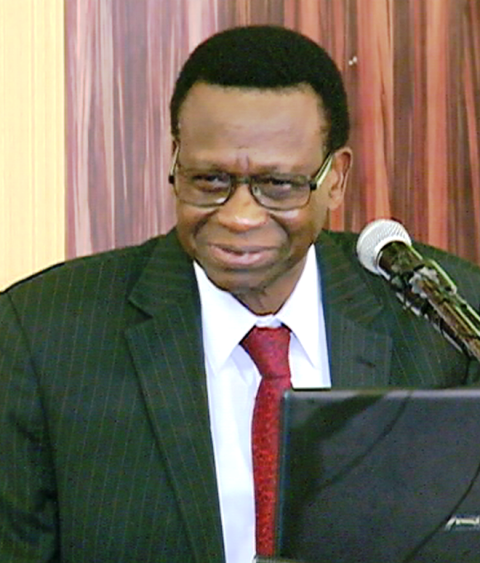Education key to oil, gas sector development -T&T professor
GINA, GUYANA, Friday, August 26, 2016
Guyanese packed the Savannah Suites of the Pegasus Hotel, Georgetown to capacity, on Thursday at a public lecture on, ‘the importance of education in the development of the oil and gas sector- experiences and perspectives of Trinidad and Tobago’. The lecture was delivered by Professor Andrew Jupiter.
Hosted by the Ministry of Natural Resources in celebration of Mining Week, Professor Jupiter’s hour -long presentation examined how linking the emerging oil and gas sector with education is critical to maintain the international standards required in the sector.
“A possible first step to the development of the required human resource for the sector could be the establishment of energy based apprenticeship programmes,” Professor Jupiter said.

The audience paying rapt attention to Professor Andrew Jupiter’s lecture. In front row (left to right): Minister of Finance Winston Jordan, Minister of Natural Resources Raphael Trotman, Vice Chancellor of University of Guyana Prof. Ivelaw Griffith, Speaker of National Assembly, Dr Barton Scotland and Chairman of the Natural Resources Parliamentary Sectoral Committee, Odinga Lumumba.
These programmes could provide continuous supply of craftsmen and technicians, the professor added. As the sector begins to develop, a large cadre of highly trained personnel with transferable skills will emerge.
“When you start you have to look beyond. You have to look at local capital and public training; it has nothing to do with engineers, that’s where you want to go,” Professor Jupiter said.
The role of the state is very important in facilitating this development through education, Professor Jupiter said. “Education will play a significant role in filling the human capital gap in Guyana’s energy sector. Developing human capital is one way to convert below the ground non-renewable petroleum resources into above the ground renewable human resources,” Professor Jupiter noted.
Education is critical to Guyana’s sustainable energy sector and overall economy. As the sector grows, spending on education can increase. “You are at the top bracket in terms of resource development as a country at this time. This is an exciting time in Guyana; go back to school and learn something,” Professor Jupiter urged.

Professor Andrew Jupiter
Professor Jupiter urged that contract arrangements be negotiated to the benefit of the people.
Professor Jupiter served as Trinidad and Tobago’s Permanent Secretary in the Ministry of Energy and Energy Industries from 1998 to 2004. He served as President of National Energy Corporation of Trinidad and Tobago 2009-2012.
He holds a Bachelor of Science in Natural Sciences, Post Graduate Diploma in Petroleum Engineering from the University of the West Indies (UWI). He also holds a Master’s of Engineering Degree in Mineral Engineering Management from the Pennsylvania State University.
Currently, Professor Jupiter is attached to the department of Chemical Engineering, UWI, serves as Energy Consultant with Trinidad and Tobago Methanol Company and Chairman of the Petroleum Company of Trinidad and Tobago.
Guyana is strengthening bilateral arrangements with Caribbean nation in the areas of education, infrastructural development, oil and gas, eco-tourism and agriculture, Minister of Natural Resources Raphael Trotman said.

